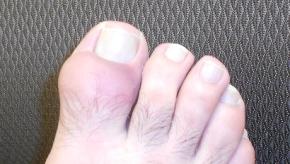All News
Airway Inflammation Drives Rheumatoid Risk
A cohort analysis of the Nurses' Health Study suggests that asthma and COPD are associated with increased risk for incident rheumatoid arthritis (RA), independent of smoking- thus airway inflammation may be an important factor in the evolution of pre-cllnical RA.
Read ArticleDon't Blame the Weather in Sjogren's
Seasonal variations in symptoms -- commonly reported by patients with rheumatic diseases -- were not observed in a large cohort of patients with primary Sjogren's syndrome, French investigators found.
Read ArticleFolate Levels Protect from CV Mortality in RA
In a study of rheumatoid arthritis (RA) patients, JAMA reports that serum folate level of greater than 4.3 ng/mL was associated with lower CV mortality risk.
Read ArticleInterleukin-37 Targeting in Gout
The Annals of Rheumatic Disease reports that interleukin- 27 (IL-37) may play an important role in the pathogenesis of gout, paving the way for future therapy with recombinant IL-37 in gouty arthritis.
Read ArticleRheumNow Podcast- Methotrexate Mechanisms (2.28.20)
Dr Jack Cush Reviews the news and journal articles from the past week on RheumNow.com
Read Article
Links:
Dr. John Cush RheumNow ( View Tweet)

Dr. John Cush RheumNow ( View Tweet)

Links:
Dr. John Cush RheumNow ( View Tweet)

Serum aldolase serves as a useful marker for diagnosis and assessment of disease activity in patients with adult-onset Still's disease. https://t.co/K1Z8uqLwML
Dr. John Cush RheumNow ( View Tweet)

Dr. John Cush RheumNow ( View Tweet)

Dr. John Cush RheumNow ( View Tweet)

Links:
Dr. John Cush RheumNow ( View Tweet)

Dr. John Cush RheumNow ( View Tweet)

Dr. John Cush RheumNow ( View Tweet)

Dr. John Cush RheumNow ( View Tweet)

Dr. John Cush RheumNow ( View Tweet)

Links:
Dr. John Cush RheumNow ( View Tweet)

Links:
Dr. John Cush RheumNow ( View Tweet)

Dr. John Cush RheumNow ( View Tweet)

Links:
Dr. John Cush RheumNow ( View Tweet)








